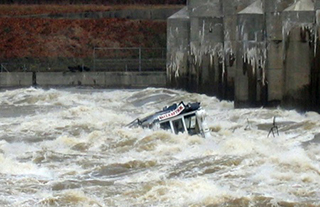The Coast Guard’s annual towing industry safety statistics report counted four crew fatalities related to towing operations in 2014 – the lowest number on record going back to 1994.
The volume of oil spilled in accidents has nearly flat-lined in recent years, with the final conversions of the tank barge fleet to double hulls as mandated by the Oil Pollution Act of 1990. The Coast Guard calculated that during 2014, 2.68 gals. of oil were spilled for every million gals. transported by barge – most of it in a single high-profile accident in the Houston Ship Channel.
The report’s findings were presented to the American Waterways Operators industry group two weeks ago, at a meeting of the National Quality Steering Committee, the Coast Guard-industry group that examines needs for safety and environmental protection.
“The original mission of this partnership has matured to the point where we are now able to focus not only on safety and the environment, but also on how we, together, meet the needs of our nation in terms of marine transportation," said Rear Adm. Paul Thomas, the Coast Guard assistant commandant for prevention policy.
For the past 15 years the steering committee has used a set of metrics to measure safety performance: crew fatality rates, oil spill rates, oil spill volumes, vessel incidents and crew injuries.
Crew fatality rates have shown a long term decline, typically around seven a year now, down from the peak of 29 deaths in 1997. Still, falls overboard are the leading cause of death, about 50 percent of all cases documented since the mid-1990s, and two to four a year since 2010.
Most striking in the report is the documented decline of oil spills from tank barges, a trend that started in the late 1990s as operators began compliance with OPA ’90 double-hull barge construction standards.
Except for a spike in 2005 with the sinking of tank barge DBL-152 in the Gulf of Mexico, and another bump up from incidents in 2008, the trend has been downward.
During 2014, in total volume, 200,363 gals. of oil spilled in 85 barge pollution incidents, with 84% of that total coming from a single accident: the March 2014 collision of a barge tow and bulk carrier in the Houston Ship Channel that tied up traffic for days.
That accident involving the 607' Summer Wind and two 300'x54'x12' tank barges carrying fuel oil, towed by the 78'x28' towboat Miss Susan, spilled some 168,000 gals. of bunker fuel into the channel.
In a report issued in June, NTSB investigators found fault with the towboat’s captain, for attempting to turn across the path of the Summer Wind, and with actions by the ship’s master and the pilot from the Houston Pilots Association who was aboard the bulk carrier. Houston’s Vessel Traffic Service and the Coast Guard got some blame as well for their procedures, and the NTSB’s recommendation for a separation zone in the Bolivar Roads reach of the waterway.
Vessel incidents were down slightly in 2014 compared to 2013, with nearly 90% of all reportable incidents classed as minor. Similarly, about two-thirds of the 133 crewmember injuries were classed as minor or moderate in 2014, with a slight increase in more serious injuries from the year before. The main causes for serious injury are falling onto surfaces, getting hurt by lines, strikes by moving objects and crushing injuries.
The Coast Guard’s Thomas said the towing safety statistics report is used to identify and prioritize areas for improvement.
“We need to look at this and ask, where are those places that we might find ourselves in a stern chase if we don’t get out ahead today,” he said. “The regulatory process can be tough. We need non-regulatory solutions.”




